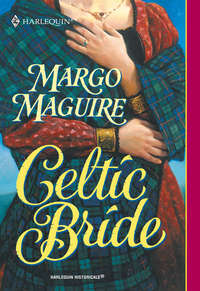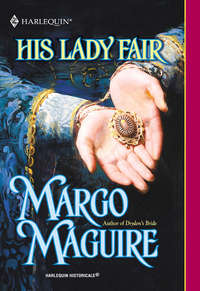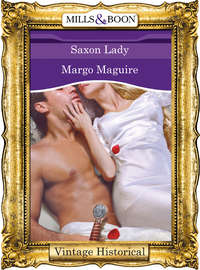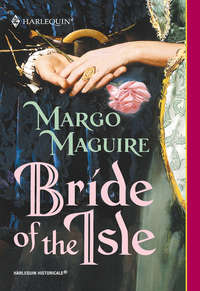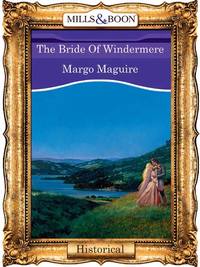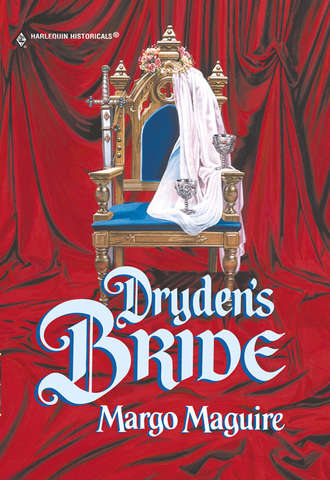
Полная версия
Dryden's Bride
The contemptuous bastard.
Siân swallowed back the bitter tears that never failed to come when she thought of the two youthful friends, gap-toothed Idwal and freckled Dafydd. Never in her life, if she lived for a century or more, would she forget her pain, or her guilt in the deaths of those two young boys. For she had been the one Wrexton was after, not two innocent Welsh boys. She, Siân Tudor…the daughter of the rebel.
The babe in Siân’s arms began to cry again, and she was diverted from further thoughts of the two boys as she rocked the child and increased the volume of her song. It was a simple little Welsh song, a lullaby, but it seemed to soothe the child nearly as much as it soothed Siân’s own soul.
“Huna blentyn yn fy mynwes,
Clyd a chynnes ydyw hon…
Sleep my baby, at my breast,
’Tis a mother’s arms round you…”
If only she were the little one’s mother, Siân thought wistfully, motherhood being one of many simple pleasures she was to be denied. Owen had decided that marriage was beyond her. As her closest male relative, Owen would not allow Siân to marry any of the young men of Pwll, all of whom were below the high and mighty—but impoverished—Tudors. Which was just as well, as Siân would never again put another Welsh-man at risk of Saxon vengeance.
There certainly weren’t any Saxon noblemen of Owen’s acquaintance who would offer for her, even if she would deign to have one. She was too Welsh, too unsophisticated, and entirely too lacking in dowry.
Siân had considered running away from Owen and the life he’d chosen for her, but she did not know where she could go or how she would manage to live. A woman alone had little chance of survival. On more than one occasion, Owen had told Siân that she was not the kind of woman to attract a man for anything more than a lighthearted tryst. She was too headstrong, too impertinent, and just too unsuitable.
As a result, she was to be consigned to the nunnery.
And Siân was afraid that would prove a difficult burden for one who had never been particularly pious.
Hugh stretched his tired muscles and leaned back against the stone corner of the parapet. He heard the sweet tones of Lady Siân’s singing as she paced the length of the stone walk, and he felt his own soul quiet within him. He did not understand her words, but the sounds of comfort were clear, and the infant in her arms was soothed by the song.
An unfamiliar contentment filled him as he listened to her. Siân was a fey child, not nearly as beautiful as Lady Marguerite, but she was interesting. Perhaps more than interesting, he decided, she was even compelling at times. He thought of the incident the previous night, when her saturated gown had dropped and she’d stood nearly naked before him. Hugh could not remember ever wanting a woman as powerfully as he had at that moment, and had she not run from his chamber, he was not sure what he’d have done.
Even now, hearing her pleasing voice in the distance, Hugh could envision her eyes, deep blue as they’d been with arousal; her lips, moist and full. Curling tendrils of her fiery hair had framed the pure white skin of her delicate cheeks and gently shaped chin. Her lush body against his own was a torture he could not have imagined, a torture he had wanted to continue at any cost.
His groin tightened even now with the thought of her, and he knew it was a mistake ever to have thought of her as a “fey child.”
Hugh quickly turned his thoughts to the festivities presently going on in the great hall. He had declined to participate. Not only was he too weary, but he felt like no one’s hero, and didn’t care to be feted by anyone in any way. He had yet to make his proposal of marriage to Lady Marguerite and still wasn’t convinced it was the right thing to do, in spite of Nicholas Becker’s arguments.
Hugh had no stomach for warfare anymore. His entire life had been spent either in training for war, or in actual battle. Here at Clairmont, there were no signs of the Scots giving up. Hugh knew that if he wed Marguerite, he’d have to withstand ever more of these border skirmishes until the Scots were defeated once and for all.
Perhaps, though, with an able leader at Clairmont and more victories against them, the Scots could be induced to stop their raids all the sooner. It was something to consider. Clearly, this had been the goal of the Parliamentary Council when they’d suggested the marriage.
Hugh was dressed in a most unassuming manner, but the dark patch that covered one eye was not easily hidden. The parapet guards spotted him quickly and saluted him as their recognized leader—the man who’d led them to victory. Hugh acknowledged them, but turned away to find a dark and quiet perch near a turret, where he could watch the turbulent sky without being seen. He sat back against the stone wall and stretched his legs out before him.
Hugh had surprised himself by rising to the challenge of battle last night and all through the day. It had been gratifying to discover that he was still a fully capable soldier, archer, swordsman, commander; that men still followed his confident lead.
The question was whether or not Hugh cared to acquiesce to the council’s wishes and provide Clairmont with the leader that was so desperately needed here. He had his own estate to the south, nearer to Windermere, and though he did not believe that Castle Alldale was as prestigious as Clairmont, Alldale’s lands were prosperous. No reasonable man could be dissatisfied with the holding. And there was peace in Alldale. No borders to protect, no marauders to overcome.
No killing to carry out.
The clouds thickened and obscured the moonlight, and night intensified around Hugh. Deep in shadow, he sat still, preoccupied with his ruminations, hardly aware of the gathering storm or anything else going on around him.
When Siân inadvertently tripped over Hugh’s feet, it was only because of his quick reflexes that she did not drop the babe she carried and fall on her face.
“Och!” she cried as the infant took up howling again. “I am sorry, my lord! I did not see you there in the dark.” She felt like a fool. Always awkward, forever clumsy—especially around Alldale. He must think her an absolute dolt. As did Owen. As did everyone she met.
“It is nothing, Siân,” he said darkly, holding her arms to steady her, “do not fret so.”
“You are kind, my lo—” But before Siân completed her thought, the infant belched loudly and spit a goodly amount of mother’s milk onto the shoulder of her bodice and down one sleeve. Siân wanted to crawl into a cave and hide.
Hugh’s brows rose.
Siân stifled a groan. Truly he did think her an idiot, and with good reason. She had plenty of experience with babies, yet she had wandered away unprepared, without so much as a cloth to clean the babe if necessary.
Siân shook her head in dismay just as fat droplets of rain began to shower them. Hugh quickly pulled her and the child into the shelter of the nearby turret and watched as the clouds opened up. There was soon a curtain of rain all around them, with ominous rumbles of thunder and shimmering bolts of lightning in the distance. The infant settled down, and drowsed on Siân’s shoulder.
Siân looked around the dark and empty turret. She knew she should not be alone with the earl, for there were proprieties to observe, her innocence to preserve. She was pledged to St. Ann’s, but looking at him now…the breadth of his chest, the strength of his hands, the power in his thighs…Siân suppressed a shiver that had nothing to do with the chill in the air, and everything to do with the way he’d touched her the night before, how he’d stood up for her to Owen, and kissed her hand.
“Perhaps, genethig,” Siân said to the babe, turning her attention from the kind and competent man standing next to her, “it was not a new tooth at all, but rather a sour stomach that caused your troubles.”
Hugh Dryden wreaked havoc on her equilibrium. Working to regain her composure, she spoke softly to the babe in Welsh. Siân knew she looked awful, as Owen had told her so not long ago, and now she smelled like sour milk, too. Very impressive.
“I—I had no time to change…” she offered lamely. She knew she must look like a troll.
“Clearly, there was further need of your skills amongst the villagers,” Hugh said offhandedly as he peered out the narrow window of the turret.
This Saxon earl cut an imposing figure, Siân thought wistfully. Wearing a light tunic and dark chausses, he stood tall and quiet in the faint light of the turret. He truly was the hero of Clairmont, Siân thought, just as the people were saying.
Lightning flashed again, and thunder rumbled in the distance, giving Siân a new reason to be uneasy. Her brow creased in concern. “Will we be safe up here?”
Hugh nodded in reply, and Siân realized that she could see him better now. The low rumbles and faraway flashes of light had become almost constant; their faces were illuminated often, as if by an unearthly, flickering fire. She tried to make herself relax, but the fierceness of the storm was beginning to frighten her.
“The worst of it is still in the distance,” he said.
“Will it get worse here?” Siân asked, gazing worriedly through the narrow window at the driving rain outside. Violent storms always frightened her, and this one seemed to carry the wrath of God with it. “Lightning? Floods?”
“Could be,” Hugh said absently. “But it could blow over. Or change direction.”
Siân was not reassured. She shivered suddenly, violently, and backed away from the open window, holding the infant more closely. “We should go down,” she said.
“Not yet,” Hugh replied, just now realizing Siân’s fear. “This will let up in a few minutes, then I’ll escort you down,” he said to reassure her.
Siân glanced out the doorway, and Hugh could see that the fool woman was considering whether to make a run for it through the rain to get to lower ground. Haste would likely make her slip on the wet stone and injure herself, perhaps even drop the child. He could not let her go.
“Lady Siân,” he said, attempting to mask his exasperation, “the storm is in the distant hills. You need not be concerned for your safety.”
Siân wasn’t so sure. Lightning had struck the church tower in Pwll many years before, and that was a memory she would never lose. She did not care to be high up in the castle turret when the worst of this storm struck, although a run through the cold rain was not appealing, either. She knew the earl was right—that there was time before the storm worsened—but still, it was difficult to remain calm.
Stiffening her backbone, Siân strove to rein in her anxiety. She was a grown woman, not some child to be ruled by her fears. “I’ve seen storms,” she said, “that—Och!”
A fierce arc of lightning lit up the near sky, then instantly a bone-rattling thunderclap sounded. Siân jumped. At the same time, Hugh turned to reassure her, but somehow drew her into his arms, surprising them both, and waking the babe Siân held. The wound in Hugh’s upper arm began to bleed, which Siân noticed as they broke apart.
Over the infant’s crying, Siân exclaimed, “You’re hurt!”
“’Tis naught,” he replied. “I’ll tend it when we go down.”
“But it’s bleeding badly,” she told him. Hugh’s need momentarily surpassed Siân’s fear. She looked around to see if there was a cloth to be used to stanch the flow of blood, but there was nothing. Her mind off the storm for the moment, Siân went to the doorway and looked for a guard.
They must all have taken cover from the rain.
“Here,” she said, handing the infant to him to hold with his unhurt arm. “Take her for a moment.”
Hugh felt an instant of shock when she shoved the child at him. He held the babe awkwardly with his uninjured arm, and watched as Siân turned around, then bent over and pulled up the hem of the ugly, dark over-kirtle she wore, to expose the fine, white linen gown underneath. A smooth, elegant length of leg was exposed, as well, and Hugh’s mouth went dry as he turned quickly away from her inadvertent display.
He heard the tearing of cloth, then suddenly she was there, taking the babe from him, pressing the clean linen to the wound near his shoulder, stanching the flow of blood.
“You should have this attended to, my lord,” Siân admonished severely. She could not see the wound through his light tunic, but by the volume of blood staining the cloth, she knew it was long and deep. “You might well lose your arm with a wound this severe.”
“And what would you know of lost limbs?” Hugh answered with derision.
Siân froze. His tone of voice had changed. Now he sounded just like all the other haughty Saxons she’d recently met. For all she knew, he could have been one of the Saxon soldiers who’d repeatedly harassed Pwll and the other Welsh border villages in retribution after the Glendower revolt. She should have known better than to allow herself any warm feelings for a Saxon aristocrat.
They were all the same.
What did she know of lost limbs, this earl wanted to know? Siân didn’t care to recount the terrible price of those bloody raids on her people—the lost lives, as well as lost limbs. Nor did she want to recall the atrocities committed by some of the Saxon pigs, when their victories had already been secured.
With lips pressed tightly together, Siân plopped the makeshift bandage into Hugh’s free hand. She wrapped the child securely in her little wool blanket and ran from the turret, moving quickly down the open stone steps in the pouring rain.
Hugh slapped the bloody dressing back on his wound and cursed himself for a fool.
The lady had only tried to be kind, but he’d insulted her intelligence, speaking to her as if she were a simpleton. He hadn’t really meant to offend her, but any talk of lost body parts always set him to boiling. How could anyone know how it was to lose a limb…an eye? Certainly not Siân Tudor, the softhearted, stormy young sister of Squire Owen.
She’d been angry with him—there was no doubt of it in Hugh’s mind. Her mouth had been pressed so tight that her lips were nearly white in the unnatural light of the storm. Her eyes, too, Hugh thought…deep blue, and flashing with fury.
And as Hugh leaned back to watch nature’s tumultuous display outside, he knew a moment’s regret for the few sharp words he’d thoughtlessly thrown at her. She received enough harsh treatment from her own brother. She certainly did not need more from him.
Chapter Four
Hugh assisted Queen Catherine from her horse and walked through Clairmont town with her entourage as she surveyed the damage and bolstered the spirits of her son’s people. Hugh gave Catherine a great deal of credit. Her petit Henri would become King Henry VI one day, and the queen had learned some valuable lessons from the boy’s father during their short marriage. One of those lessons had been the importance of the people’s good wishes toward their monarch.
Hugh Dryden and Owen Tudor walked with the queen as she progressed on foot through the town, speaking to everyone who crossed her path. As she passed, she gave small tokens of her presence—ribbons, a bit of silk, a small leather pouch—and questioned individuals on how they and their families had fared in the battle.
Lady Marguerite accompanied the party, following at a close distance with Nicholas Becker and Sir George, as well as the reeve of Clairmont. They discussed grain and food stores, survival of the livestock, and the death toll in the town. Hugh and Nick were asked about methods of securing Clairmont and how to protect themselves from further attack.
There were no easy solutions to the problems Clairmont faced, though Hugh knew they were not insurmountable. Between himself and Nicholas, they could call a hundred knights to battle. The only question was one of payment. Was Clairmont rich enough to support additional knights?
With careful portioning, there would be enough food to last the winter. Some goods could be imported—Hugh knew that Alldale, among other estates, had had very productive growing seasons. It was possible there were surpluses that could be purchased. Again, it was a matter of funds.
“Look, Owen,” the queen said, pointing toward one of the distant fields. “It is Siân, non?”
Hugh looked up as Owen followed the queen’s glance and everyone saw that Siân was indeed on the hillside with a large group of children. To Hugh, she was little more than a spot of bright blue on the hillside, topped by a cheerful crown of red-gold. She was too far away to see her features, although he didn’t need to see her to know how her mouth quirked in laughter. Or the impudent tilt of her chin.
Her brother, Owen, sighed in frustration and said, “I’ll go and get her, your Highness, and try to—”
“Non, Owen,” Catherine interjected. “Leave her.”
“But—”
“Do you not see, Owen?” the queen asked. “She has taken all of the smallest ones and gotten them out from underfoot. She has them playing at a…” She searched for the English word. “A pageant. See how some are sitting in a circle around the performers in the center?”
“You are right, Your Majesty,” Lady Marguerite said. “How clever of her.”
Hugh heard Siân’s laugh carry over the distance, then the gleeful giggles of the children in her care. He supposed it was clever of her to have gotten the children out of the way as the adults cleaned up the town and tended the wounded. Tudor’s sister seemed to have a way with the little ones, he thought, perhaps because she herself was so childlike.
She ought to get back to the castle, Hugh thought, or at least closer. No telling whether or not they’d been successful in routing every Scotsman from the area. He’d never met anyone so naive, so ingenuous. Hugh doubted she ever gave a thought to her own safety.
Hugh’s attention was drawn back to Lady Marguerite. With a no-nonsense manner, Marguerite Bradley saw to her responsibilities with a deep sense of duty. Her assessment of the situation at Clairmont was astute. Action had to be taken to ensure the success and continuity of her town, and Hugh had no doubt that the lady would manage it. Everything about Marguerite indicated an efficiency of mind and deed.
Her manner in all things was serious and thoughtful. Hugh doubted there was a foolish or frivolous bone in her body.
Even Marguerite’s clothing bespoke her elegant competence. Expensive silks and woolens were dyed to perfection and tailored into fashionable gowns. Shoes were made to match. Her sable hair was perfectly arranged—not a hair out of place under stylish headgear.
Hugh glanced back at Siân, just as she dropped to the ground amid the laughter of her small charges. Then he studied Marguerite’s profile. The lady of Clairmont was certainly beautiful, he thought, as well as intelligent and competent: a prize any man would be proud to claim.
She would be a perfect wife, and Hugh decided to make his marriage proposal when they returned to the castle.
But not until after he’d seen to it that Lady Siân and the children moved themselves closer to town.
Siân desperately wished she had a few more weeks of freedom. To be allowed to sing and play with the children, to ride the horses lent her by the castle grooms, to swim in the cold waters of the lake…She lowered her eyes in resignation. All too soon, she would travel to St. Ann’s, where she would be far removed from everything familiar, from all that was dear to her.
She knew little of nunneries, only the stories she’d gleaned from different people over the years, and Siân had no reason to doubt what she’d heard. She was certain, for example, that the abbess would lock her in a “cell” every night to sleep on a narrow bed of straw. She’d heard that nuns had their hair chopped off and their bald heads covered by tight, ugly wimples that firmly bound their chin and cheeks. Siân assumed she would be compelled to wear a hot, itchy under-kirtle that would chafe her sensitive skin, and she would be required to spend hours upon hours on her knees, praying for the salvation of souls all across Britain.
But the most dreadful thing was that she would have to put all thoughts of Hugh Dryden out of her mind. Siân wasn’t sure if that was going to be possible. The man had plagued her thoughts ever since shooting the boar out from under her in the forest. He had saved her life, and she wasn’t about to forget him…or the way her heart seemed to skitter when he was near.
She shivered slightly when she recalled the way Hugh had efficiently unlaced her soaking gown that first night, then wrapped her in his own blanket. Siân had never experienced such remarkable sensations before. It was as if he had somehow reached inside her and kindled a mysterious fire within. Parts of her body became exquisitely sensitive, and he had barely even touched her.
His hands were strong, but gentle. His words curt, but not unkind. At least, he’d been kind until she’d thoughtlessly spoken of losing a limb. Clearly, he did not need her to teach him about such loss. She deserved the harsh words he’d delivered to her last night during the storm.
With a heartfelt sigh, Siân gathered the children around her and they sat together on a blanket of dry leaves under an ancient oak tree. She had to stop thinking of Hugh and truly resign herself to her fate at St. Ann’s.
Owen’s decision was final. Siân had no choice in the matter.
“In my country, there is a place called Llanfabon, where the faeries like to make mischief,” Siân said as one of the older girls sat down and began to plait her hair. Another child picked wildflowers and threaded them into Siân’s russet tresses. “And in Llanfabon, there once lived a widow woman and her small son, Pryderi.”
By telling the old tale, Siân hoped to get her wayward thoughts under control. It was no use thinking of Hugh Dryden or his heroic rescue—not only of her, but of Clairmont itself. He was remote and aloof, always so serious, Siân thought. Surely he had not been afire the night he’d gotten her out of her wet clothes. Siân knew she was not likely to inspire any sort of longing in a man.
Siân tamped down her irrational sense of defeat and continued her tale. “One day, while the widow was making her little son’s breakfast, she heard a commotion outside. The cattle were lowing down in the byre. Pryderi’s mother was afraid something was amiss.”
“What could it be?” a little girl asked.
“’Twas a wolf!” cried one of the boys.
“No…” Siân said dramatically. “Remember, there were faeries in that part of the country…”
Which started a flurry of questions about faeries and whether or not they could be seen nearby, and if ever they caused mischief among the cows and pigs at Clairmont. The children crowded around her and plied her with their queries, so preoccupied that none of them took note of the knight who’d walked up behind them.
Hugh delayed his return to Clairmont to tell Siân to move in closer to the town with the children since there could still be danger lurking in the outlying forest. He’d intended to speak to her right away, but instead, kept his silence as he approached her and the children, unwilling to put a stop to the sound of her engaging voice and her pleasing Welsh accent.
She continued her story as the children sat spellbound. “When the poor mother returned to their cottage, she was suspicious that something had changed. ‘Och, child,’ she cried, ‘you look like my sweet Pryderi, yet you are somehow different. I fear it is not really you I see before me.’
“The child, who was different, awakened. He said, ‘Of course it is I, Mother. Who else would I be?”’
One of the little girls interrupted the story. “Did the faeries take Pryderi from his mother?”
“Did they give her a changeling?” another asked.
“The poor old mother did not know for certain,” Siân replied. “But the only way she knew to find out, was to ask the wise man of the village…”
Hugh leaned his back against a tree and watched as Siân wove her magical spell for the children. She was a gifted storyteller, he thought as she changed her voice and moved her delicate hands to emphasize parts of the story. His earlier impression of Lady Siân as a faerie sprite was not too far from reality, and he found himself falling under the spell of that voice, those hands.


